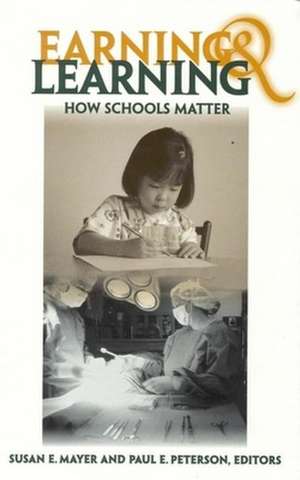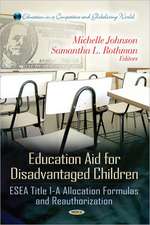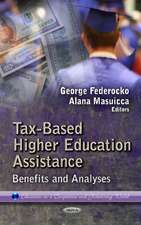Earning and Learning: How Schools Matter
Editat de Susan E. Mayer, Paul E. Petersonen Limba Engleză Paperback – aug 1999
Education is one of the largest sectors of the U.S. economy--yet scholars, educators, policymakers, and parents do not agree about what the money spent on education really buys. In particular, they do not agree on how much education improves children's ability to learn or whether the things children learn in school truly improve their chances for success as adults. If schooling increases how much students know and what they know does pay off later, then it is important to ask what schools can do to increase students' learning and earning. The essays in this book report estimates of the effects of learning on earnings and other life outcomes. They also examine whether particular aspects of schooling--such as the age at which children begin school, classroom size, and curriculum--or structural reform--such as national or statewide examinations or school choice--affect learning. Taken together, their findings suggest that liberals are correct in saying that more investment is needed in early education, that class sizes should be further reduced, and that challenging national or state standards should be established. But they also provide support for conservatives who ask for a more demanding curriculum and greater school choice. Contributors include John Bishop, Eric Hanushek, James Heckman, Christopher Jencks, Caroline Minter Hoxby, Fred Mosteller, and Christopher Winship.
Preț: 222.69 lei
Nou
Puncte Express: 334
Preț estimativ în valută:
42.61€ • 44.60$ • 35.47£
42.61€ • 44.60$ • 35.47£
Carte tipărită la comandă
Livrare economică 31 martie-14 aprilie
Preluare comenzi: 021 569.72.76
Specificații
ISBN-13: 9780815755296
ISBN-10: 0815755295
Pagini: 365
Dimensiuni: 152 x 229 x 25 mm
Greutate: 0.55 kg
Ediția:New.
Editura: Brookings Institution Press
Colecția Brookings Institution Press
ISBN-10: 0815755295
Pagini: 365
Dimensiuni: 152 x 229 x 25 mm
Greutate: 0.55 kg
Ediția:New.
Editura: Brookings Institution Press
Colecția Brookings Institution Press
Notă biografică
Susan E. Mayer is associate professor of sociology in the Harris School of Public Policy Studies at the University of Chicago and author of What Money Can't Buy (Harvard, 1997). Paul E. Peterson is the Henry Lee Shattuck Professor of Government at Harvard, the director of PEPG, and a senior fellow at the Hoover Institution. He is author or editor of numerous books, including The Education Gap: Vouchers and Urban Schools, with William G. Howell (Brookings, 2004 and 2006). He is coeditor (with Martin West) of No Child Left Behind? The Practice and Politics of School Accountability (Brookings, 2003).
Descriere
A Brookings Institution Press and Russell Sage Foundation publication
Education is one of the largest sectors of the U.S. economy--yet scholars, educators, policymakers, and parents do not agree about what the money spent on education really buys. In particular, they do not agree on how much education improves children's ability to learn or whether the things children learn in school truly improve their chances for success as adults. If schooling increases how much students know and what they know does pay off later, then it is important to ask what schools can do to increase students' learning and earning.
The essays in this book report estimates of the effects of learning on earnings and other life outcomes. They also examine whether particular aspects of schooling--such as the age at which children begin school, classroom size, and curriculum--or structural reform--such as national or statewide examinations or school choice--affect learning. Taken together, their findings suggest that liberals are correct in saying that more investment is needed in early education, that class sizes should be further reduced, and that challenging national or state standards should be established. But they also provide support for conservatives who ask for a more demanding curriculum and greater school choice.
Contributors include John Bishop, Eric Hanushek, James Heckman, Christopher Jencks, Caroline Minter Hoxby, Fred Mosteller, and Christopher Winship.
Education is one of the largest sectors of the U.S. economy--yet scholars, educators, policymakers, and parents do not agree about what the money spent on education really buys. In particular, they do not agree on how much education improves children's ability to learn or whether the things children learn in school truly improve their chances for success as adults. If schooling increases how much students know and what they know does pay off later, then it is important to ask what schools can do to increase students' learning and earning.
The essays in this book report estimates of the effects of learning on earnings and other life outcomes. They also examine whether particular aspects of schooling--such as the age at which children begin school, classroom size, and curriculum--or structural reform--such as national or statewide examinations or school choice--affect learning. Taken together, their findings suggest that liberals are correct in saying that more investment is needed in early education, that class sizes should be further reduced, and that challenging national or state standards should be established. But they also provide support for conservatives who ask for a more demanding curriculum and greater school choice.
Contributors include John Bishop, Eric Hanushek, James Heckman, Christopher Jencks, Caroline Minter Hoxby, Fred Mosteller, and Christopher Winship.













